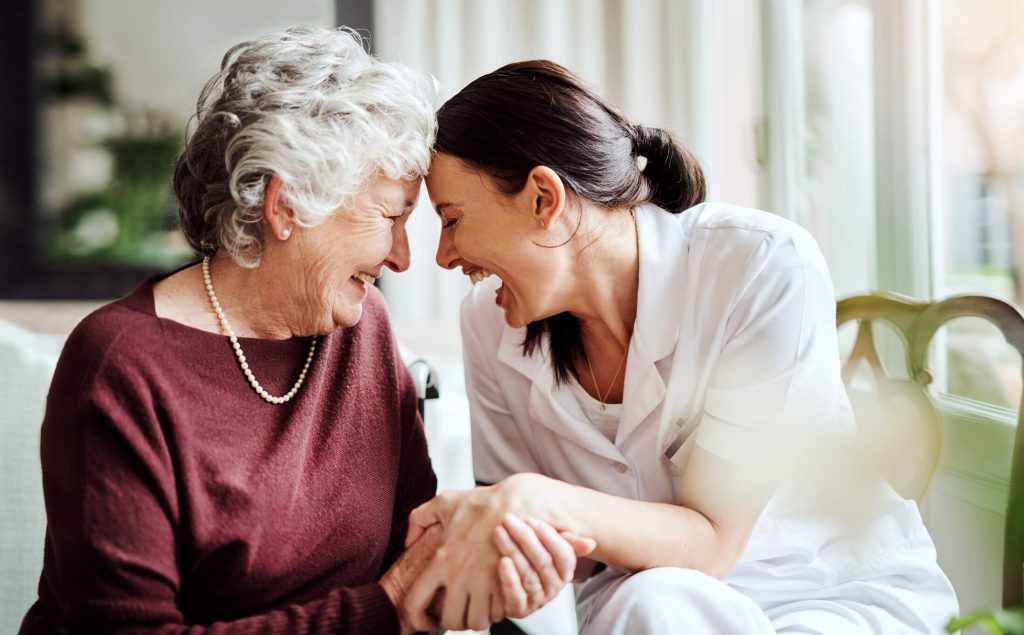Being a caregiver is a selfless and compassionate task. It takes time, energy, and a good amount of patience. It can also be extremely taxing on a person’s mental, emotional, and physical health. In many cases, caregivers may neglect their own personal care because they spend so much time caring for others. According to AARP, a staggering one in five Americans provide care to a family member. With that in mind, we created a helpful list of self-care tips for these dedicated caregivers.
1. Remember to treat yourself.
When you are a caregiver, you end up sacrificing time intended for your own self-care. While this is understandable, it is important to remember that your loved one wants and needs you to be happy as well. So, take the time to treat yourself on occasion. If you are struggling emotionally, it may be a great time to enjoy a good movie or TV show that can make you laugh or help you relax. Other simple ways to treat yourself are to sleep in on occasion or go to dinner with a friend. If you really need to decompress, consider a relaxing trip to a spa, where you can get a massage and have someone focus on your needs for a day.
2. Take a break or go on vacation.
If the opportunity allows, take time for yourself this year by getting away from your daily tasks. Plan a vacation to a favorite place or choose somewhere you have always wanted to go. Taking a few days to unwind will help rejuvenate your mind and soul. If not having someone to care for your loved one is keeping you from getting away, consider a professional respite care provider. Resources such as ARCH National Respite Network and Resource Center can help you locate qualified respite providers in your area.
3. Take care of your physical health.
Eating healthy meals regularly can help keep your energy up and bolster your immune system. It’s also important for caregivers to get a full night’s sleep as often as possible. Lack of sleep affects your mental ability and can lead to both short- and long-term illness. Another important aspect to maintaining good physical health is to exercise routinely. Your workout does not need to be complex or high intensity: simple cardio fitness such as walking or biking is extremely beneficial. The key is to fit exercise into your schedule a few times every week. Remember: your health is just as important as your loved one’s.
4. Join a support group.
If you find yourself struggling, a support group can help you handle the challenges that come with being a caregiver. Support groups allow you to meet people who are experiencing similar challenges and gain insights and ideas from them. They are also great for simply connecting with people who are willing to listen to your struggles. The Family Caregiver Alliance (FCA) is a good place to get started when looking for a support group. If a group setting does not appeal to you, consider finding a counselor or seek out a friend or family member who will listen. Talking to someone and just knowing you’re not alone can help ease the worries you’re experiencing.
5. Ask for help.
It’s understandable to feel as though you are the best person to care for your loved one because you know their needs, likes and dislikes, and so much more. However, it is important to remember that others may wish to help and be more than willing to step in when needed. If they do ask to help, let them. There is no shame in accepting or needing assistance when caring for your loved one. Also, don’t hesitate to ask. Be honest and upfront about the kind of support you need and let them decide if and when they can help.
It is also beneficial to have someone help with tasks you may neglect for yourself because your time is spent caring for a loved one. Maybe you need help running errands or taking your kids to school. Help with your own personal responsibilities can make all the difference when it comes to your health and wellbeing. As a caregiver, you take on a lot of responsibility. It is important to remember that you are just as important as your loved one.
Provision Living is here to help.
Provision Living is a provider of independent living, assisted living, and memory care communities and services to older adults in Michigan, Missouri, Ohio, and Tennessee. Visit ProvisionLiving.com for more information.
Image Credit: istockphoto.com


